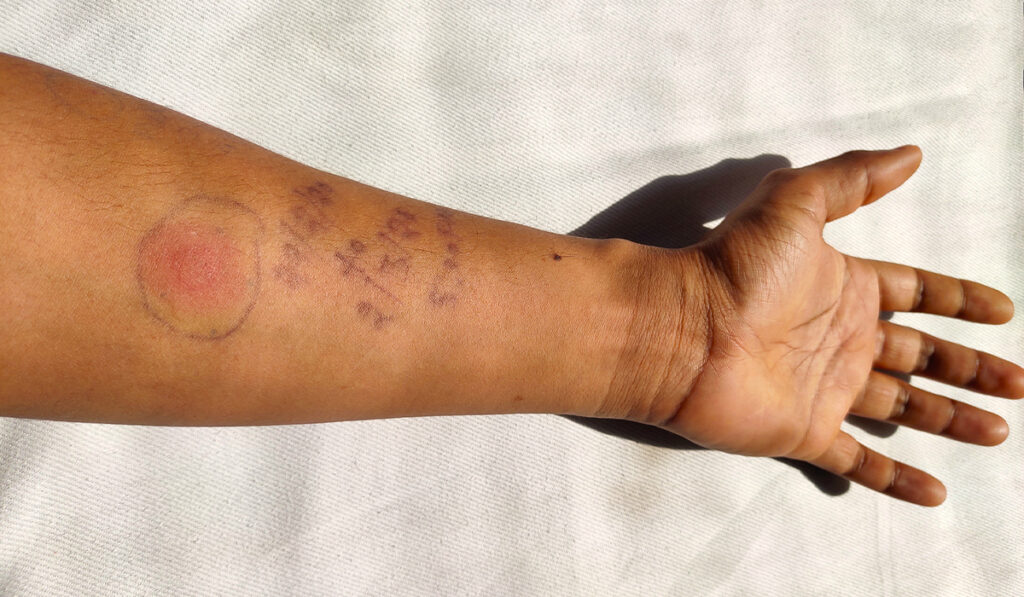A disease that impacts nearly a quarter of the world’s population is being examined by researchers internationally and at Vanderbilt University Medical Center for insights into comorbidities and active-versus-latent infections.
Timothy R. Sterling, M.D., professor of medicine and director of the Vanderbilt Tuberculosis Center, serves as co-principal investigator for the Regional Prospective Observational Research in Tuberculosis (RePORT)-Brazil network, a jointly funded venture of the NIH and Brazil’s Ministry of Health.
The group seeks to optimize care for more than 2 billion people infected with TB around the globe through research into common comorbidities, such as TB/HIV and TB/diabetes. There is also a focus on TB treatment and prevention, as well as TB diagnostics, drug-resistant strains, and genetics.
Sterling’s co-principal investigator for RePORT-Brazil is Bruno Andrade, M.D., Ph.D., a Vanderbilt adjunct assistant professor of medicine based in Salvador, Brazil.
RePORT-Brazil investigators recently published work on diagnostic biomarkers for active TB; gene expression in TB/diabetes; treatment outcomes of diabetic and non-diabetic TB/HIV co-infected patients; and predictors of unsuccessful treatment outcomes in TB.
The team’s most recent influx of funding comes through a five-year $5 million NIH grant.
Top Areas of Concern
Progression of TB from latent infection to active disease is being examined closely, Sterling said.
“Although only 5 to 10 percent of those infected progress to active disease, TB infection affects about one-quarter of the world’s population,” he said.
Both HIV and diabetes significantly increase the risk of TB infection, typically lead to worse outcomes, and can affect TB transmission, Sterling added.
Another area of focus is multi-drug-resistant TB. Of particular concern is resistance to isoniazid and rifampin, two key drugs used in TB treatment. Combination therapy with newer drugs is possible, but Sterling notes those also may lead to resistance. Additionally, he says some of the alternative therapies are not well-tolerated, which can jeopardize completion of treatment.
Framework for Research
RePORT’s robust infrastructure enables its wide-ranging research capabilities, Sterling said.
The group enrolls patients with active TB, as well as their close contacts. Both groups are followed for two-year periods to measure the response to therapy among those with active TB and any progress from latent infection to active TB among the close contacts. Data and specimen collection were other key parts of the infrastructure – including DNA, RNA, peripheral blood, mononuclear cells, urine, sputum, whole blood, and TB isolates. The RePORT-Brazil biorepository houses over 300,000 specimens.
Sterling said he hopes the recent funding will draw more basic science and translational researchers into the work. Vanderbilt has additional funding set aside to facilitate construction of new biosafety level-three laboratories, essential for the study of TB and other airborne pathogens.
The RePORT-Brazil funding also will support nurses, doctors, administrators, and laboratory personnel in immunology and microbiology – at least 60 people in all – at the study sites in Brazil.
Future Projects and Expansion
Looking forward, Sterling sees efforts to increase the number of participants in the TB and close contacts cohorts who go on to complete the full two-year follow-up period, as well as the number of patients who complete TB treatment.
A potential future area of research includes sub-clinical TB, in which people have active, transmissible disease but do not have symptoms. There may also be a focus on post-TB disease, which has been compared to long COVID-19, with lingering effects on the lung and other organs and mental health.
“TB is a disease of poverty, of people living in close quarters, who may also be undernourished.”
“TB is a disease of poverty, of people living in close quarters, who may also be undernourished,” Sterling said.
Brazil became a focus for study when the World Health Organization identified the country’s caseload as high-burden, with . The country also is well-equipped with infrastructure and the capacity for translational research. Other RePORT networks, in addition to Brazil, include South Africa (where Vanderbilt also has a presence), India, Indonesia, China, the Philippines, and South Korea.
“RePORT’s goal is to follow participants in a harmonized way in different countries so that we can evaluate what research findings are or are not generalizable,” Sterling said. “For example, if a biomarker identified in Brazil predicted patients who are likely to progress to TB, we would want to verify whether that applies as well in South Africa or China or India.”
Sterling emphasizes the importance of his Vanderbilt and international collaborators, who must handle a host of regulatory issues, including approvals for use of specimens, legal issues regarding data privacy, material transfer agreements, data-use agreements and more. This work requires contact with offices throughout the Vanderbilt enterprise and elsewhere in the United States.
“RePORT’s goal is to follow participants in different countries so that we can evaluate what research findings are or are not generalizable.”
Marina Cruvinel Figueiredo, D.V.M., M.S. , a researcher originally from Brazil, is based at Vanderbilt’s Tuberculosis Center and has been the primary research program manager for RePORT-Brazil since 2014. She was joined more recently by Cody Staats, M.S.
Additional Vanderbilt faculty and staff engaged in RePORT-Brazil include biostatistician Gustavo Amorim, Ph.D.; biomedical informatics specialist Stephany Duda, Ph.D.; infectious disease statistician Megan Turner; epidemiologist Peter Rebeiro, Ph.D.; and Hilary Vansell Riley, , project manager for the Tuberculosis Center.
“This is a large operation, with many ongoing activities,” Figueiredo said.




